This product is not exportable outside the United States.
By adding this item to cart, you agree and acknowledge the Export Policy and confirm that you are a person in the United States with no intentions to illegally export the device.
This product is not exportable outside the United States.
By adding this item to cart, you agree and acknowledge the Export Policy and confirm that you are a person in the United States with no intentions to illegally export the device.


0

0

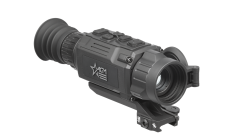
$845.00
Detector type: 12μm Uncooled
Refresh rate: 50 Hz
Resolution: 256 × 192
Base Magnification: 2.5x
FOV: 9.3° × 6.9° (49ft @ 100 yards)
$845.00
Detector type: 12μm Uncooled
Refresh rate: 50 Hz
Resolution: 256 × 192
Base Magnification: 2.5x
FOV: 9.3° × 6.9° (49ft @ 100 yards)
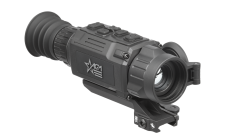
$1,095.00
Detector type: 12μm Uncooled
Refresh rate: 50 Hz
Resolution: 256 × 192
Base Magnification: 3.5x
FOV: 7.0° × 5.3° (37 ft @ 100 yds)
$1,095.00
Detector type: 12μm Uncooled
Refresh rate: 50 Hz
Resolution: 256 × 192
Base Magnification: 3.5x
FOV: 7.0° × 5.3° (37 ft @ 100 yds)
AGM Global Vision thermal weapon sights use the latest infrared imaging technology to reveal temperature variations and fluctuations that occur in both natural and man-made objects. They use that information to generate an image even in near to total darkness. With multi-coated, Germanium lenses and compact, sturdy housing, our sights are water, dust, and sand-proof for unmatched reliability in uncharted territories, rough terrain, and extreme weather conditions. Our thermal weapon sights also offer:
Our thermal weapon sights are developed using the science of black body radiation, which demonstrates that objects with a temperature above absolute zero must emit infrared radiation. Radiation levels increase or decrease in response to changes or variations in an object’s temperature; thermal photography, or thermography, works by detecting the level of radiation that an object emits and translating it into an image. A thermal weapon sight, otherwise called a thermographic weapon sight or thermal imagery scope, combines a thermographic camera and an aiming reticle in one device that can be mounted on a variety of weapons. AGM Global Vision superior thermal weapon sights are made from high-grade construction materials that are lightweight, weather-resistant, and tough.
We offer a wide range of field-tested, Military-grade thermal weapon sights. They feature:
With precision top wheel focus and an ergonomic body, our thermal weapon sights allow the exceptionally accurate positioning and targeting while maximizing user comfort.
All AGM Global Vision thermal weapon sights are built to last, with a quality construction and host of feature that enable our customers to feel safe, adaptable, and fully in control during covert operations, territory exploration, routine enforcement, and everything in between. Our thermal weapon sights are water and fog-resistant, and always created for the most demanding tactical professionals. AGM Global Vision customers know that our products offer superior quality and exceptional performance that’s low-maintenance and cost-effective.
Surely every hunter dreams that his favorite pastime is not only exciting but also comfortable. Fortunately, today, an incredible number of devices and devices are designed to provide the hunter with any assistance in the forest. For example, take a situation when he, going out into the woods, at one moment heard the rustle of an animal near him. Still, it turned out to be quite dark, or poor visibility due to fog prevented him from getting into the animal and even just looking at it. In such cases, you can use devices such as a night vision device (binoculars, monoculars) or a thermal vision device that will help you find the animal in poor visibility at any time of the day. In this article, we will focus on thermal weapon devices, their types, and their advantages.
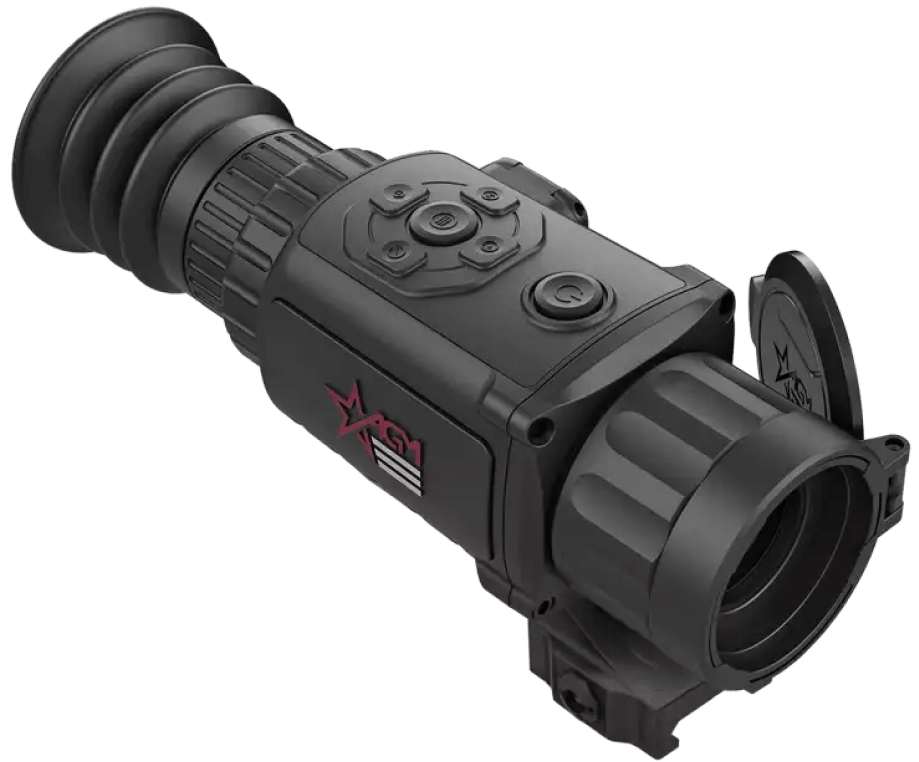
Thermal vision devices work on an understandable principle. Almost every object around us is a thermal radiation source and is called infrared. So the thermal device, thanks to the matrix, captures radiation and converts them into a clear picture. The brightness of the glow depends on the object's temperature, so in trees and organisms, it will be different. On the screen, in addition to the picture, other indicators are depicted: time, battery charge, sighting grids, and parameters. Therefore, before buying such devices, be sure to pay attention to important details - the lens, the resolution of the matrix, and the frame rate. They affect the range of observation, segment, and quality of video shooting.
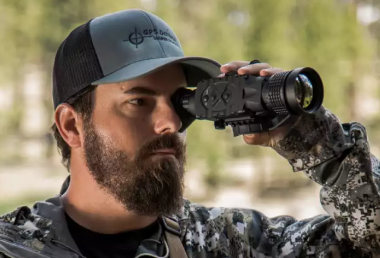
Usually, hunters prefer to use a thermal device in the form of a monocular, which will be quite enough to see the animal. But for perfect shooting, it is probably not suitable, so that you can use another type of thermal vision device.
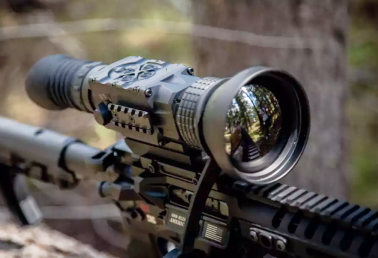
But the primary type of thermal device is a sight. It also has similarities with the monocular but differs from the sighting reticle, which allows you to aim at the animal quite accurately and mount under the landing base of the weapon.
At first glance, it may seem that the scope is just a type of thermal imaging device consisting of one tube. On the one hand, this is true: the technology is identical, the visualization is practically the same. But, there is one crucial nuance - night vision scopes, in addition to reticles, have increased strength. This means that they successfully withstand the full power of the weapon recoil.

It is pretty essential to remember the main benefits of thermal sights, which will be helpful to a successful hunt. What exactly are these criteria? We will now consider.
CONTRASTED
So, as you know, there are many thermal devices, their manufacturers, and, accordingly, additional characteristic functions. The first criterion on our list will be contrasted. Usually, the thermal sights and scopes produce more than 15,000 gray gradations. Still, the human eye cannot physically perceive all these shades, so the signal of the thermal vision device decreases, but the maximum level of detail is preserved. Obstacles like thick bushes, tall grass, or snow prevent you from seeing the object of interest. Still, it is essential to remember that the thermal vision device does not recognize thermal radiation behind the walls and behind the glass that does not transmit infrared radiation.
COLOR MODES
The following and a rather important criterion in our list is color modes. They are designed to improve object recognition. The thermal imager provides the best visibility at night and in the year's cold season. At night, the air cools noticeably, which increases the contrast of warm objects. The temperature difference between heat sources and the air becomes more noticeable, making the thing easier to recognize. In summer, the temperature contrast between objects on the ground can be insignificant, so it is more challenging to determine heat sources. For such cases, it is convenient to use color modes.
If we analyze the technology of thermal vision in detail, we must also mention the superpower of such devices. Unlike night visiondevices, which amplify light, a thermal sight captures thermal signatures and visualizes them. It doesn't need light. Weather conditions do not matter either. But, it is worth remembering that even such a fantastic thing becomes useless in situations where heat signatures cannot be registered. For example, when objects are behind glass.
Of course, the scopes of this formation have excellent performance and will be helpful in every hunter. Nevertheless, not always these devices can solve your problems. Therefore, it would not be harmful to have one device of each technology in your arsenal.
When choosing a thermal sight, you need to pay attention to the main criteria to serve you for a long time and not let you down at the right time.
resolution
So, the first is the resolution of the thermal sight. If your hunt is designed for a small game, the device should have a resolution of 1.1 billion pixels, and for the big game, 2.2 billion.
other lenses
It is possible to change other lenses on some devices, depending on the surroundings or weather conditions. They allow you to change the viewing angle and visibility range. The wider the viewing angle, the smaller the maximum distance at which the object is visible.
frame rate
The frame rate is another criterion that determines whether the picture will slow down or hang. We advise you not to take a thermal sight with a frequency of fewer than 30 frames per second for your comfort. Dynamic observation of the device requires at least 60 frames per second. Then the observation will be of high quality and without braking.
Hull protection
Hull protection plays a significant role in the hunt. The device must be protected from moisture and dust. If the safety of the case is good, then the thermal vision device will serve you for a very long time.
Please pay attention to the matrix. It affects the image quality of the picture, the temperature threshold, and the degree of error. If the resolution is high, then the quality of the matrix is better. Nowadays, the most significant expansion of the matrix is 640x480 pixels. And the sensitivity of the thermal should be approximately 0.05-0.08 degrees to be able to see an unmistakable silhouette of the beast.